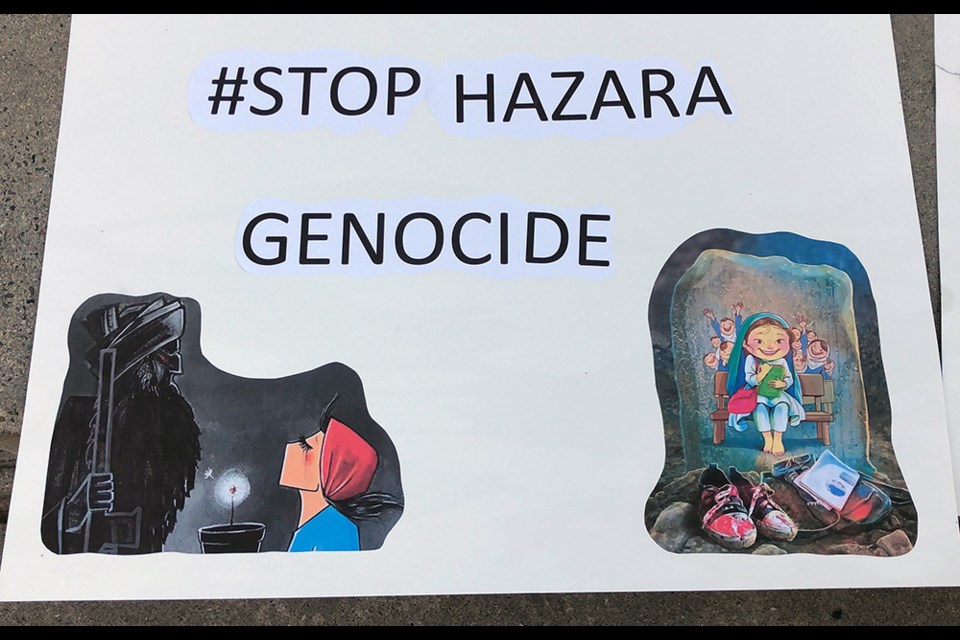On Aug. 15, 2021, the Taliban pushed an offense into Afghanistan's capital of Kabul, leading to eventual control of the country.
Not long after, Shayesta Azizi, who had just graduated high school, walked in Coquitlam to protest the human rights violations that cascaded across her homeland in hopes local residents will understand the turmoil.
"I was crying the morning when I saw the news that the Taliban took over the country because I knew what the consequences were," she explained.
More than a year later, the now 19-year-old raised her voice in Town Centre Park once more in the aftermath of another human rights tragedy.
A suicide bomber blew himself up in a Kabul education centre on Sept. 30, 2022, killing more than 50 people — mostly young Hazara girls.
"Schools last year, when [the Taliban] took over Afghanistan, they banned girls from going to school. This particular school did not ban or stop educating these girls. It's really, you know, upsetting to see that my own people are suffering from their basic human rights, which are being taken away from them," Azizi told the Tri-City News about the terrorist attack.
The Hazaras are native to the Hazaristan region in central Afghanistan and is considered one of the largest ethnic groups in the Middle Eastern nation.
"So we're trying to spur awareness as much as we can, start local and then to reach our goal to get an international audience for national leaders' attention to take some action. Take actual actions, and to put aside this government."
On Saturday (Oct. 8), Azizi organized a local protest and rally in hopes members of the public that walked by or saw their signs understood why they should be standing in solidarity with Afghan women and girls.
She believes it's important for humanity, regardless of upbringing, cultural heritage or background, to stand together against a regime that denounces women's right to a full education.
"We're standing up for humanity, and just not just for Afghanistan. There's been so much more happening overseas....Now is a great time to come together and stand up for your fellow humans," she said.
"It doesn't matter what their backgrounds, where they live, which parts of the world they are, and it's just standing up for humanity. That's what humans are for, right? Not just caring about yourself. It's care for your culture, care for your society, your fellow humans; just stand up for them."
Azizi was born in Afghanistan, but moved to Pakistan at one years old as her mother, an activist at the time, feared for her family's safety when the Taliban begun a rapid expansion.
At 12, her family moved to Canada and settled in the Tri-Cities where she's been able to thrive in her community having access to education without discrimination or misogyny.
She's now enrolled in rental property management at UBC, but as it's not full-time at the moment, Azizi is also taking legal studies courses at Douglas College.
Needless to say, her path to a bright career is off to a terrific start and she's very grateful for the opportunities that lie before her.
Azizi, however, believes it's important to remember there are many that may never earn the chance to receive an education, which should be a basic human right wherever one calls home.
"I have many cousins and many relatives that are not able to go to school. They're just sitting at home or doing housework and not being able to reach their full potential, reach their goals, their dreams," she replied with great sadness.
"It was really upsetting to see such a thing happen. Seeing such a thing like this happening in 2022 is just really shocking. These people [the Taliban] are living in this mindset and it's literally living like you're thousands of years ago, where they're misogynistic mindsets are horrible to limiting rights for these girls. They're just really horrible. It's very sad."
With one final thought, Azizi is calling on world leaders to do more than simply not recognize the Taliban as Afghanistan's current government, but to recognize the movement as the continued genocide of the Hazaras.
She believes justice is needed for every girl that didn't make it home from school that Sept. 30 day in Kabul.
"Bring peace to these people that they deserve. They haven't seen peace, they haven't tasted peace in years. Everyone deserves to live in a country where you have your basic human rights. And, you know, you have your freedom. Bring the peace that the people deserve."





